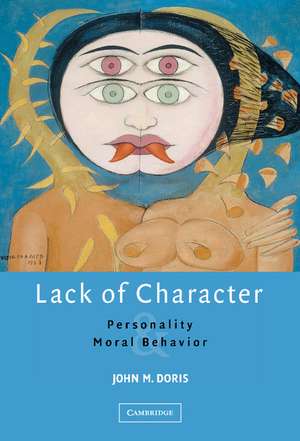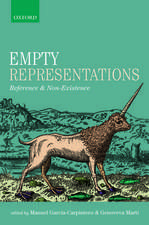Lack of Character: Personality and Moral Behavior
Autor John M. Dorisen Limba Engleză Hardback – 14 aug 2002
| Toate formatele și edițiile | Preț | Express |
|---|---|---|
| Paperback (1) | 225.79 lei 6-8 săpt. | |
| Cambridge University Press – 6 mar 2005 | 225.79 lei 6-8 săpt. | |
| Hardback (1) | 646.57 lei 6-8 săpt. | |
| Cambridge University Press – 14 aug 2002 | 646.57 lei 6-8 săpt. |
Preț: 646.57 lei
Preț vechi: 726.48 lei
-11% Nou
Puncte Express: 970
Preț estimativ în valută:
123.73€ • 128.34$ • 103.17£
123.73€ • 128.34$ • 103.17£
Carte tipărită la comandă
Livrare economică 27 martie-10 aprilie
Preluare comenzi: 021 569.72.76
Specificații
ISBN-13: 9780521631167
ISBN-10: 0521631165
Pagini: 286
Ilustrații: 4 b/w illus.
Dimensiuni: 152 x 229 x 21 mm
Greutate: 0.59 kg
Ediția:New.
Editura: Cambridge University Press
Colecția Cambridge University Press
Locul publicării:New York, United States
ISBN-10: 0521631165
Pagini: 286
Ilustrații: 4 b/w illus.
Dimensiuni: 152 x 229 x 21 mm
Greutate: 0.59 kg
Ediția:New.
Editura: Cambridge University Press
Colecția Cambridge University Press
Locul publicării:New York, United States
Cuprins
Preface: a renaissance of virtue; 1. Joining the hunt; 2. Character and consistency; 3. Moral character, moral behavior; 4. The fragmentation of character; 5. Judging character; 6. From psychology to ethics; 7. Situation and responsibility; 8. Is there anything to be ashamed of?
Recenzii
'Doris is exploring, and taking the lead in creating, a field of 'empirically informed ethics'. He has paid close, careful, imaginative attention to psychological studies that turn out to have relevance to questions of the determinants of moral behavior, and has extracted the implications of those studies for the theories that he has also mastered, philosophical accounts of moral character, reasoning, and the production of moral actions. This is a book that will provide impetus to the formerly flagging conversation between those concerned with what is and what ought to be in the domain of morality.' John M. Darley, Princeton University
'Lack of Character is a very important book both for psychologists and philosophers. It presents the best summary available of the psychological literature documenting the typically weak effects of personality on moral behavior and the massive effects that situations can have. The book also presents a powerful case against 'virtue ethics', which assumes that people act morally to the degree that they have certain dispositions.' Richard E. Nisbett, University of Michigan, Ann Arbor
'Lack of Character is engagingly and accessibly written, provocative, non-dogmatic, chock full of interesting arguments. It is a terrific and important contribution to moral theory and moral psychology.' Lawrence Blum, Notre Dame Philosophical Reviews
'… Lack of Character is by far the best thing I know of written on the implications of recent social psychology for philosophical discussions of virtue and character. The book refers to and assesses an extraordinary large literature in psychology, philosophy, and beyond, and works out in considerable detail one very plausible way of thinking of ethics in the light of the facts of psychology.' Gilbert Harman, Princeton University
'Doris is a punchy, spirited and bold writer who tackles the important issue of whether we are justified in our belief that there is something called stable moral character that leads to predictable behavior … His arguments do moral psychology proponents an important service by indicating how to integrate moral philosophy with current empirical research … His work should cause quite a stir within virtue ethics circles. At the very least, it should lead to a reexamination of time-worn views about character traits and their manifestations in coherent patterns of actions.' Nancy Sherman, Georgetown University, author of Making a Necessity of Virtue
'Of course, this work does not constitute a 'how-to' ethical rulebook, but it has an appealing and distressing message to those in the field of ethical practice … It is the author's intention to shed light on the situational factors influencing moral behaviour … I feel that this is an excellent book, although it seems to be missing two interesting viewpoints … the book gives an excellent overview of experimental social psychology in the domain of moral behaviour. It indeed demonstrates the poweful influence situational differences have upon moral behaviour … it is interesting for social psychologists because it summarises a field of research with great relevance outside the strict scientific commune and, hence, legitimises the discipline to a considerable extent … the book seems extremely interesting for ethicists and others studying moral behaviour, as well as people confronted with ethical dilemmas in their daily practices.' Ethical Perspectives
'Lack of Character is a very important book both for psychologists and philosophers. It presents the best summary available of the psychological literature documenting the typically weak effects of personality on moral behavior and the massive effects that situations can have. The book also presents a powerful case against 'virtue ethics', which assumes that people act morally to the degree that they have certain dispositions.' Richard E. Nisbett, University of Michigan, Ann Arbor
'Lack of Character is engagingly and accessibly written, provocative, non-dogmatic, chock full of interesting arguments. It is a terrific and important contribution to moral theory and moral psychology.' Lawrence Blum, Notre Dame Philosophical Reviews
'… Lack of Character is by far the best thing I know of written on the implications of recent social psychology for philosophical discussions of virtue and character. The book refers to and assesses an extraordinary large literature in psychology, philosophy, and beyond, and works out in considerable detail one very plausible way of thinking of ethics in the light of the facts of psychology.' Gilbert Harman, Princeton University
'Doris is a punchy, spirited and bold writer who tackles the important issue of whether we are justified in our belief that there is something called stable moral character that leads to predictable behavior … His arguments do moral psychology proponents an important service by indicating how to integrate moral philosophy with current empirical research … His work should cause quite a stir within virtue ethics circles. At the very least, it should lead to a reexamination of time-worn views about character traits and their manifestations in coherent patterns of actions.' Nancy Sherman, Georgetown University, author of Making a Necessity of Virtue
'Of course, this work does not constitute a 'how-to' ethical rulebook, but it has an appealing and distressing message to those in the field of ethical practice … It is the author's intention to shed light on the situational factors influencing moral behaviour … I feel that this is an excellent book, although it seems to be missing two interesting viewpoints … the book gives an excellent overview of experimental social psychology in the domain of moral behaviour. It indeed demonstrates the poweful influence situational differences have upon moral behaviour … it is interesting for social psychologists because it summarises a field of research with great relevance outside the strict scientific commune and, hence, legitimises the discipline to a considerable extent … the book seems extremely interesting for ethicists and others studying moral behaviour, as well as people confronted with ethical dilemmas in their daily practices.' Ethical Perspectives
Notă biografică
Descriere
This is a provocative contribution to contemporary ethical theory challenging foundational conceptions of character.

















